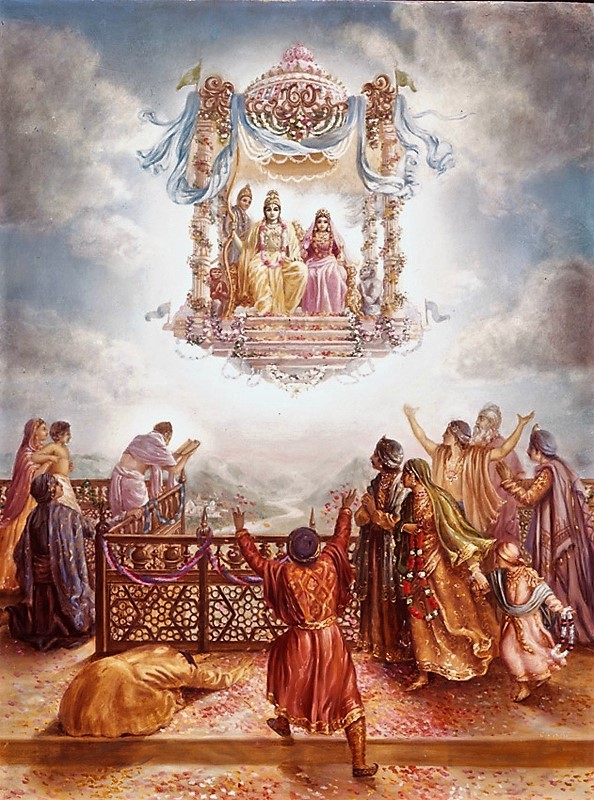 Śrīla Bhaktivedānta Nārāyaṇa Mahārāja: There is a secret meaning behind the pastime of Queen Kaikeyī asking two boons from Mahārāja Daśaratha. Kaikeyī was not cruel. She loved Śrī Rāma more than she loved Bharata. When Rāma was a young boy, He sat on the lap of Mother Kaikeyī and requested, “I want to ask you something. When I grow up and return home after My marriage, My father will think of giving his kingdom to Me. I want you to ask him to give the kingdom to Bharata and send Me to the forest for fourteen years.” Hearing this, Kaikeyī fainted. When she regained consciousness she said, “I cannot do such a cruel thing.” But then Lord Rāma told her, “For the benefit of the whole world, you will have to do this.” She finally agreed.
Śrīla Bhaktivedānta Nārāyaṇa Mahārāja: There is a secret meaning behind the pastime of Queen Kaikeyī asking two boons from Mahārāja Daśaratha. Kaikeyī was not cruel. She loved Śrī Rāma more than she loved Bharata. When Rāma was a young boy, He sat on the lap of Mother Kaikeyī and requested, “I want to ask you something. When I grow up and return home after My marriage, My father will think of giving his kingdom to Me. I want you to ask him to give the kingdom to Bharata and send Me to the forest for fourteen years.” Hearing this, Kaikeyī fainted. When she regained consciousness she said, “I cannot do such a cruel thing.” But then Lord Rāma told her, “For the benefit of the whole world, you will have to do this.” She finally agreed.
There is another important point in this connection. When King Daśaratha married Kauśalya, he did not beget any sons from her. He further married 360 queens, but still there was no son. One day, when he was out in the forest hunting ferocious animals, he travelled all the way to the border of Afghanistan. He was very tired and therefore went to visit his friend Mahārāja Kaikeya, the king of that area, to rest. Mahārāja Kaikeya ordered his daughter to take care of the king. The next day, very pleased by her service, Mahārāja Daśaratha asked him if he could marry his daughter. The king said, “Yes, you can marry her, but with one condition, If she begets a son, that son will become the king of your entire kingdom.” Mahārāja Daśaratha replied, “There is nothing that would please me more. I have no son, so if she begets a son, I will be very happy to give him my entire kingdom.” This was another reason that Bharata was destined to become the king instead of Rāma.
Viṣṇu dāsa: Guru Mahārāja, you said in your class that the night before Janaka Mahārāja was to make the decision as to whether or not Lord Rāmacandra should stay in the forest, Bharatajī went to meet the wife of Janaka Mahārāja, Sunāyanā. At that time Bharata requested her to tell Janaka Mahārāja what to say the next day. Was Janaka Mahārāja influenced by Sunāyanā, or was his decision independent?
Śrīla Bhaktivedānta Nārāyaṇa Mahārāja: He was not influenced by anyone. He was only influenced by his guru, Śaṅkara. His example is ideal. All devotees should be guided only by their guru or guru-paramparā.
Rāmacandra dāsa: You said earlier that after the exile, Bharata never addressed His mother as “Mother.” One time you also told the history that Kaikeyī came to Rāma and told Him that Bharata refused to call her “Mother.” Lord Rāma then called Bharata and said, “I want you to promise Me something.” Bharata said, “I will do anything for You – anything except calling Kaikeyī ‘Mother.’ ”
But yesterday in your class you mentioned that He did call her “Mother.” What did He really do?
Śrīla Bhaktivedānta Nārāyaṇa Mahārāja: When Lord Rāmacandra returned from exile, He first went to Kaikeyī’s house. When he arrived there, he asked, “Where is Bharata? Up until now Bharata was with Me; so where has he gone?”
Someone said that Bharata did not want to see the face of his mother. He had broken his relation with Kaikeyī and determined, “I am not your son, and you are not my mother. I will only call you “Mahārāṇī Kaikeyī.”
While Rāma was still in exile, all the subjects of Ayodhyā would go to Bharata in Nandigrāma and seek advice. One day Kaikeyī went to him and said, “Bharata, you are my son, so please keep me here with you in Nandigrāma. I cannot tolerate living in the king’s palace. So many ‘serpents and scorpions’ (memories) are biting me, so I cannot remain there.” Bharata replied, “This is very good for you. This is your atonement, and by this you will be purified. There is no other way. It is better, Kaikeyī Mahārāṇī, that you return to the palace.”
But now, upon His return, Lord Rāmacandra called for Bharata, because it was by the will of Rāma that the relationship between Bharata and Kaikeyī had been broken. When Bharata arrived, Lord Rāmacandra offered obeisances to Mother Kaikeyī, and then He told Bharata to offer obeisances to her and to call her “Mother.” Bharata then offered obeisances to Kaikeyī and addressed her, “My dear Mother,” or “My darling Mother,” at which Kaikeyī began to weep due to immense happiness. Lord Rāmacandra’s heart also melted, and the hearts of all of the people present also melted.
Mahābuddhi dāsa: Did Lord Rāmacandra ever tell Bharata that He had made that arrangement with Kaikeyī when He was young?
Śrīla Bhaktivedānta Nārāyaṇa Mahārāja: No.
Śrīpāda Mādhava Mahārāja: We went two times with Śrīla Gurudeva to Citrakūṭa, the place where Lord Rāmacandra, Lakṣmaṇa, and Bharata met together. There are many footprints still there, so many footprints, just as in Vraja where there are so many footprints of Kṛṣṇa.
Śrīpāda Śrauti Mahārāja: What is the lesson, or philosophical point, behind this history?
Śrīla Bhaktivedānta Nārāyaṇa Mahārāja: The lesson is that if anyone is against guru and Kṛṣṇa, we will have  no connection with them. We will cut off all connection, even if that person is our mother, brother, sister, father, or any other dear-one. If a guru is opposed to Kṛṣṇa and is insulting Him, we will also reject that guru.
no connection with them. We will cut off all connection, even if that person is our mother, brother, sister, father, or any other dear-one. If a guru is opposed to Kṛṣṇa and is insulting Him, we will also reject that guru.
Devotee: Is there any difference between the siddha-jīva and Your Grace?
Śrīla Bhaktivedānta Nārāyaṇa Mahārāja: As a disciple, you should think I am a perfected soul, but I am not. I don’t want to cheat you. I am not perfect. I am a baddha-jīva (conditioned soul).
Govinda dāsa: That is not possible.
Śrīpāda Padmanābha Mahārāja: This can be compared to Caitanya Mahāprabhu, who never wanted to be called Bhagavān, but who actually is Bhagavān.
Śrīla Bhaktivedānta Nārāyaṇa Mahārāja: No, no. I don’t want to cheat you. But it is true; a disciple should think, “My Gurudeva is perfect, and he is the associate of Kṛṣṇa.”
Image/Art made possible by Pixabay.com & Krishnapath.org








